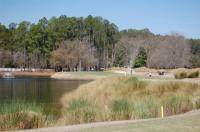|
Reader Feedback
We want to make this newsletter as useful as possible for you. If you have comments, critiques, suggestions or observations about the newsletter, please email them to me at This email address is being protected from spambots. You need JavaScript enabled to view it..
I promise to respond quickly.
Private, public golf club choices aplenty
Excellent private and public golf clubs abound across the land, and with the economy reducing membership rolls, some private clubs have drastically cut initiation fees, and even eliminated them in some cases. Green fees at the semi-privates are lower as well, especially with a range of tee-time consolidators slugging it out on the Internet. If you have the patience to shop around, you can do quite well.
Here are some of our favorite private and public courses that share the same geography:


Private University of Texas Golf Club at Steiner Ranch (top) and public Avery Ranch, both near Austin, TX.


Private Wachesaw Plantation (top) and Caledonia Golf and Fish Club, just south of Myrtle Beach, SC.

 Private Balsam Mountain Preserve (top) and Laurel Ridge, both near Waynesville, NC. Private Balsam Mountain Preserve (top) and Laurel Ridge, both near Waynesville, NC.
 
Private Daniel Island Fazio Course (top) and Charleston National, near Charleston, SC.
For somewhat larger views of the above images, please visit our website: http://www.golfcommunityreviews.com/ gallery-images/ private-public-partnerships.html
|
Private matters:
If the club fits, take your best shot
Private golf club membership is a wonderful luxury and inspires pride of ownership in its members. Exclusivity means no riffraff tearing up your course. You don’t have to scramble for tee times either; just walk right up and your friendly pro or starter will set you up with a game with people you probably know. A private club can be one big happy Cheers Bar, where you want to go because everybody knows your name.
But sharing facilities with only a select few comes at a price. Private clubs don’t have the kind of financial wiggle room that semi-private clubs have. Private clubs that suffer a loss of members, and therefore revenue, have to make it up with either expensive membership marketing drives or by passing the hat to existing members. The alternative, of course, is to cut back on services and course maintenance which then results in more members departing (or at least making uncomfortable noises).
Dues...and some don'ts
Public facilities don’t charge initiation fees or assessments, but many offer membership plans with dues only or an annual rate you pay at the beginning of the year. In exchange, you receive many of the benefits of a private club -– except, of course, the privacy. If you choose to pay as you go, you will find few daily fee clubs that will raise green fees during a season. On the contrary, if traffic to the course is light, the daily fee club will likely run special short-term discount programs to firm up the financials.
If you don’t mind sharing your golf course with an ever-changing group of golfers, then you might want to consider the "semi-private club" route. Definitions are a little muddy as regards "semi-private" compared with "public." Essentially, a semi-private is one that has members but also permits public play. Joining fees, where they are charged, will be as much as 2/3 less than at a private club with a comparable golf course, and dues are proportionately less as well since club costs are subsidized by the outside play.
Of course, membership in a semi-private course involves much more work than at the privates, where you can just show up and be assured of play within a few minutes. Members of semi-privates must call anywhere from a week to two weeks in advance so as not to be crowded out by public players. And if you don’t test out the course a few times before you join, you may find yourself a member in bad standing, stuck routinely behind slow golfers, resulting in five-hour rounds. Smart high-end semi-private courses use rangers to speed up play. And a few, like The Thistle Club north of Myrtle Beach, space out tee times 12 minutes apart.
Protecting your turf
Course conditions at the semi-private clubs are more fragile as well. The interlopers have nothing invested in a course that is not their regular golf location, and many of them do not replace divots or fix ball marks. I’ve played private clubs where this lax attitude about turf maintenance was an issue as well, but at least the members who care about turf matters can police those who don’t. That is much tougher at a semi-private where the majority of play is by outsiders.
Ultimately, the choice of private vs. semi-private comes down to finances, fellowship and frequency. If money is no object, the choice is clear. Ditto if building lasting relationships is as important as the quality of the golf course. But if you play, say, once every two weeks and can organize yourself to call for a tee time in advance, the semi-private course may be the right play. And the cost difference between private club membership and semi-private could easily fund an annual trip to Pebble Beach or Scotland.
Going Once, Going Twice
Until the last couple of years, it seemed that foreclosures and auctions were largely the province of small, inexpensive homes whose owners had been sniped by Countrywide Financial and other aggressive and unscrupulous sellers of sub-prime mortgages. But low-income people do not have the market cornered on bad financial decisions.
Open the Wall Street Journal or big city newspapers on any given day, and you will see the “foreclosure” or “auction” stamp on ads for homes formerly owned by the formerly rich. In the Friday November 13 Wall Street Journal, for example, I noted upcoming auctions for town homes at The Peninsula on Lake Oconee in Georgia (close to the wonderful Cuscowilla and Reynolds Plantation golf communities), and for a single-family home in The Cliffs at Mountain Park, where Gary Player is designing one of eight Cliffs golf courses (Tiger Woods is designing the other to-be-completed layout). Many more options are available at such auction house websites as AlbertBurney.com, JPKing.com and SheldonGood.com.
Best bargains in worst markets
Residential auctions are hot, up nearly 50% from 2003 to 2008, according to the National Auctioneers Association. And much of the action is in states that traditionally attract retirees and year-round golfers, such as Florida, Arizona and Nevada. As previous targets for speculative builders and investors, those states have suffered most in the housing downturn.
In more stable times, the comparatively rare auctions attracted almost exclusively investors who scoured listings for “distressed” properties they could buy at up to 25% or more off their market values, make a couple percentage points worth of cosmetic changes, and then resell at or just a bit below market price. But today, people who intend to live in the house they are bidding on stand cheek by jowl with the professional bidders. It can be an intimidating experience for the novice, but the lure of a bargain can neutralize the jitters.
Phone it in…at your risk
In many cases, you don’t even have to be present to bid. More and more auction houses are conducting online bidding, especially when a property is remotely located. But because rare are the buyers who would commit a few hundred thousand dollars via long-distance bidding, even if they have a real estate agent locally to kick the tires in their behalf, the online auctions are forced to put up undeniable bargains and “absolute” sales. The absolute sale is one in which whatever the final bid, the house sells for that price. Some banks or individuals who put a property up for bid place a “reserve” price on them; a final bid below the reserve price is not typically accepted and the house reverts to the bank or stays with the owner.
Some Johnny-come-lately auction houses think that just the word “auction” connotes bargains, and that putting up for auction homes from high-profile communities is enough to move them. The South Carolina-based UpstateBuyers.com, which I wrote about at GolfCommunityReviews.com earlier this year, tried that approach last summer with resale homes from the Cliffs Communities. But the owners’ reserve prices were just a few thousand dollars less than their previously listed prices, which turned potential buyers away. Upstate did not receive a single bid during its first two auctions last summer, and today the firm’s website has gone inactive.
Raise your hand only if you did your homework
Here are a few tips if you are considering buying a home at auction:
Attend a few auctions first. The pace of the bidding may surprise you; homes for sale are typically gaveled within a few minutes. If you want it, you need to be quick.
Do exhaustive research on the house you want and its community (if it is located in one). Do not buy anything sight (or site) unseen. That's pretty obvious advice, but you would be surprised... Tour the house or property well before the auction, preferably with an agent who knows the area. Run away if you don’t like the auction house's or real estate agent's responses to your questions.
Make sure that the title to the house is clear; the bank may be selling the house with some liens against it. A contractor, for example, could have a “mechanic’s liens” on the house for which the next owner would be responsible. A reputable local real estate agent can check town or county records for any liens, which must be on file in order to be recognized legally.
Have a not-to-exceed price in mind that is well below market value, and stick to your number. Novice bidders can get caught up in the excitement of the action and wind up paying more than they intended. If others want to bid aggressively against each other, stay out of it, at least until one of them drops out.
If you have personal experience with a real estate auction, I’d love to hear from you. Please contact me at This email address is being protected from spambots. You need JavaScript enabled to view it.. If you are interested in a home up for auction and want the name of a reputable local real estate agent in the area, contact me as well and I will put you in touch with one of the dozens of high-quality agents I know. Or I will interview a few to find the best one for you.
|